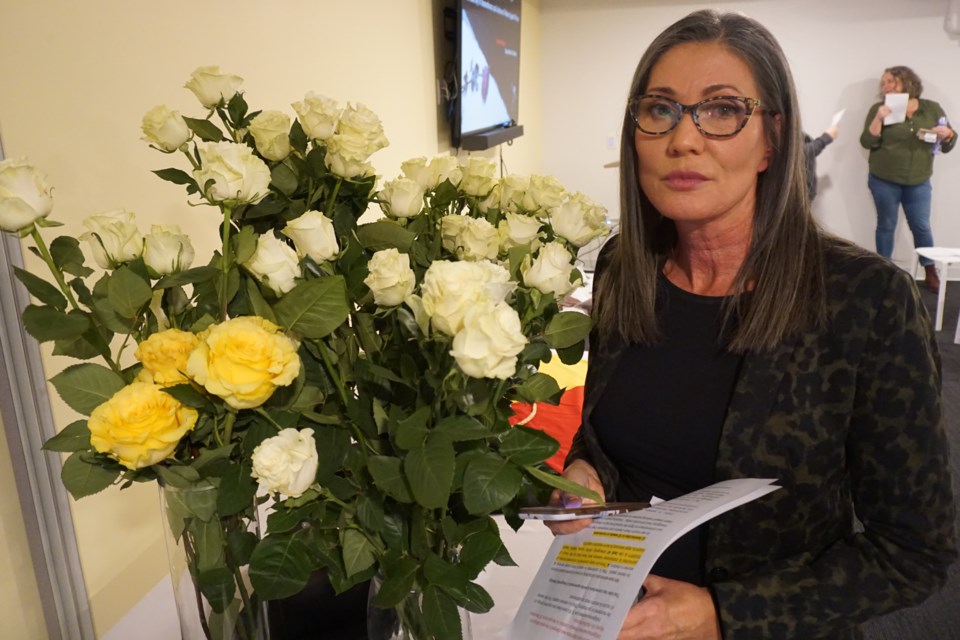A vase overflowing with red, white and yellow roses should represent a time of joy, peace and celebration.
But on Tuesday evening at Huronia Transition Homes’ Operation Grow, these beautiful flowers served as a poignant and sombre reminder of the 52 Ontario women and children murdered this past year at the hands of men they knew. The youngest victim was eight, the oldest 88.
It has been over 30 years since the murder of 14 young women at l’École Polytechnique Montréal, an an engineering school affiliated with the Université de Montréal. This act of violent misogyny shook the nation and led Parliament to designate December 6 as The National Day of Remembrance and Action on Violence Against Women.
Huronia Transition Homes program supervisor Debbie Ferrara said that day galvanized women’s groups across the country to work together towards ending domestic violence.
But Ferrara told the 100 or so area residents assembled in a basement conference room that unfortunately not much has changed since that snowy December day.
“Today, we remember those 14 women,” said Ferrara, who proceeded to read out the names of those murdered during an evening engineering class: Geneviève Bergeron, Hélène Colgan, NathalieCroteau, Barbara Daigneault, Anne-Marie Edward, Maud Haviernick, Barbara Klucznik-Widajewicz, Maryse Laganière, Maryse Leclair, Anne-Marie Lemay, Sonia Pelletier, Michèle Richard, Annie St-Arneault and Annie Turcotte.
A single red rose was placed in a nearby vase to represent the 14 women murdered at l'École Polytechnique on December 6, 1989.
That beautiful flower was followed by four yellow roses recalling the four children murdered in Ontario over the past 52 weeks and white roses to honour the 48 women murdered during the same time period.
Helen Higgins read the victims’ names; her voice occasionally breaking with emotion as she had the unenviable task of recounting how each one died.
After she read the name, one of the close to 100 people in attendance would read a statement offering hope, encouragement and sometimes shock that this pattern of violence against women shows little sign of diminishing.
“The most common way people give up their power is by thinking that they don’t have any,” an Alice Walker quote read by one participant noted.
After reading a quote, attendees would flip over a victim’s name taped to their chair and place a single rose in the soon overflowing vase. They would then stand at the back or side of the room as the process continued until all of the names were visible and the symbolism of the empty chairs was a sombre reminder of the lives lost to senseless violence.
While the murders in Montreal served as a sort of touchstone and call to action, they also served a sobering reminder of the deadly violence that women have faced throughout history, and which they continue to experience to this day.
Sadly, here in Canada, every six days a woman is killed by her intimate partner and one in three women will experience sexual violence in their lifetime, according to statistics provided by La Maison Rosewood Shelter.
Kelly Redmond, supervisor of the Athena's Sexual Assault Counselling & Advocacy Centre in Barrie, said the provincial statistic (52 femicides in 52 weeks) should give all Ontarians reason to demand change.
“It’s a heartbreaking reminder that these are not isolated incidents. We should know their names, we should be outraged,” Redmond said, noting women who leave an abusive relationship are five times more likely to live in poverty. “
But what was familiar for almost every woman or child who died in Ontario was the perpetrator. From nephews, grandsons and sons to husbands, boyfriends and neighbours, the suspects were always men.
In fact, just this past Friday, a 37-year-old Midland man armed with a rifle allegedly assaulted his partner in yet another domestic violence incident. He now faces a slew of charges.
And that brings us back to 1989 and how little society has changed since that wintry night at L’École Polytechnique Montréal.



